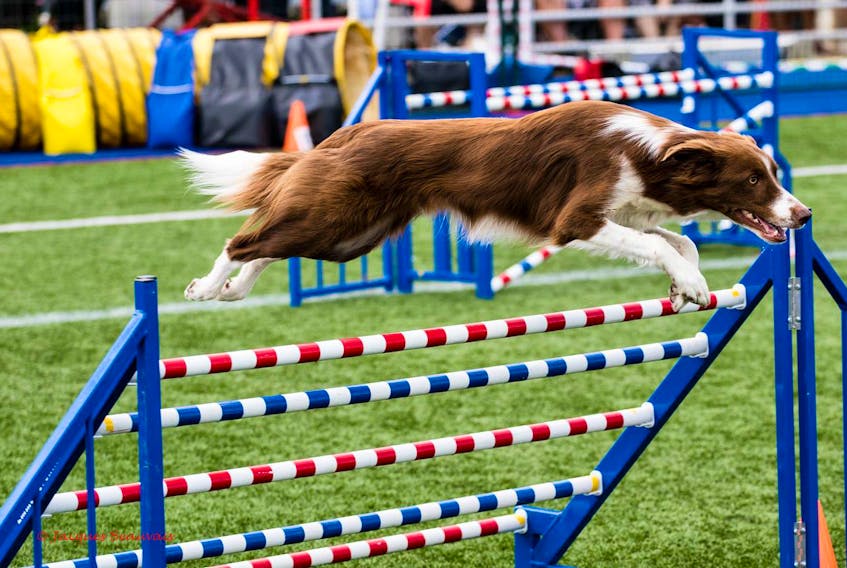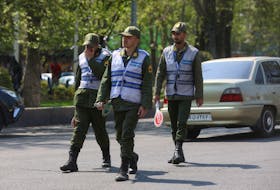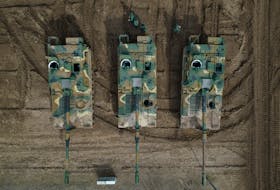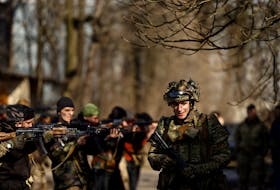The teamwork of Sarah Leblanc and her border collie Caper is taking them far from home – this year to Milan, Italy
Leblanc and Caper will be competing in the highest level of competitions: the World Agility Championships, from April 25-29. Leblanc and Caper will be competing as part of the Canadian team as She and Caper were selected from the nationals, which took place in B.C. in August.
“We placed second in the nationals, but there is a different scoring criteria for the world team,” said Leblanc. “I was an ‘alternate,’ and was on deck, in case there was a team that had to pull – and there was.”
Leblanc got the call over a month ago, when she was announced as an alternate. Due to an injury, she and Caper were asked to participate in Milan, with the Canadian team – an offer she and the energetic Caper do not intend to turn down.
Leblanc is looking forward to the world competition – something she describes as “to simplify it, basically a big obstacle course. It’s like horse jumping, except the handler is running alongside, and directing the dog.”
The course is anything but simple, with up to 23 different obstacles, and dogs navigating those courses are judged on a number of criteria, including speed and accuracy.
The most daunting thing is that Leblanc and Caper won’t know what to expect in the way of an obstacle course, until just before they perform.
“There’s a lot of nervous energy, because it’s never the same course. It depends on the judge, and the judges vary from year to year. You get a set amount of time to walk the course with your dog (before you compete),” said Leblanc.
But even walking the course to mentally prepare can be intense, since “you have 60 handlers, or more, running the course at the same time as you. You’re trying not to bump into anyone, while visualizing where you’ll be, and where your dog will be.”
Leblanc noted that experience is very valuable when it comes to dog agility competitions, and that “you get better with time.”
The competition itself is just as intense as the preparation. Dogs and their trainers are arranged into a queue and let in to compete in a sequence.
“The manager comes to get you, and your dogs. You’re in a row, and it’s a bit of a countdown,” said Leblanc, who noted it can be unnerving as the time to perform gets closer and closer, “when you start hearing the cheers and the barking. It feels good when you’re done.”
Whether or not she and Caper do great, “or something doesn’t go as planned,” Leblanc relishes the challenge of dog agility training, and finds something to celebrate, no matter what the outcome of a competition.
“I have, for sure, more confidence than I did starting out,” she said. “If it goes well, great. If not, we shake it off. The dog doesn’t know the difference, so you celebrate either way because you want your dog to have fun.”
Leblanc is no stranger to competing at the world level. She is hoping that this year Caper does as well in Italy as he did in Spain, where placed in a couple of top-10 finishes.
Leblanc’s other canine companion, Beau, has also competed on the Canadian team, having performed on a world stage for Canada in Spain last year, but since he is turning 11, he’s “enjoying semi-retirement.”
A lifelong love of animals and of working with dogs is also what keeps Leblanc in dog agility training. Her first agility dog was a pet, so training was as much of a social event as a competition.
“We know most of our team members, and we’re friends with a lot of them. (Dog agility training) is a chance to see the world, and not many people say they go on vacation with their dog – and he’s the reason we go.”
Caper, like most border collies, was bred to work and move. That canine physicality and energy serves as an asset when the time comes to dig into training.
“Dogs like border collies have jobs to do, and they need to channel that energy, so they don’t get into trouble and chew on the couch,” said Leblanc. “It takes time and commitment to train, but that’s part of what we do.”
Training is a combination of conditioning the Caper’s fitness, as well as working on skills, and agility. Leblanc can be found training with Caper at the Sobeys Soccer Complex in Stellarton, and their last training session before heading out to Italy took place yesterday evening.
Leblanc added that when the weather is nice, “we take our dogs and the equipment out into our yard and wear them out. Once we’re done, they’re nice and relaxed in the house – it’s a good way to build a relationship with your dogs.”









